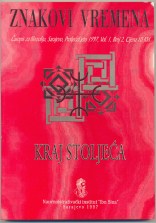The characteristics of the Muslim thought at the end of the 20th century
The characteristics of the Muslim thought at the end of the 20th century
Author(s): Rešid HafizovićSubject(s): Philosophy
Published by: Naučnoistraživački institut »Ibn Sina«
Summary/Abstract: Nobody like Muslims is metaphysically inherent with the fact that in each day of their everyday life they live at least a double life era: the Higret and the Gregorian, the holy and the secular, the global and the local. In addition to this, we should also add that the Muslims, thanks to the so far stocked theoretical experience on the idea of time within their own philosophy, theology, art and within exact sciences, live in a calendar time of a multiple temporal perspective, since their primordial, Muslim, universally Adamistic nature is flowing through all the key existential spheres of existence: the metaphysical, the metacosmical, the metahistorical, the chierocosmical, the chierohistorical, the macrocosmical, the microcosmical and the cosmohistorical. However, although their nature is inherently exposed on an unbelievably luxurious temporal profilation, even at the end of the twentieth century, as an era of the overall progress, the Muslims do not express a very full feeling and sense of time in which they are living, neither the time of past, and the least of the time to come, that eschatologically and soteriologically accented.
Journal: Znakovi vremena - Časopis za filozofiju, religiju, znanost i društvenu praksu
- Issue Year: 1997
- Issue No: 2-3
- Page Range: 89-96
- Page Count: 8
- Language: English

